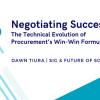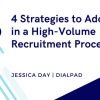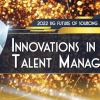Wherever you look and whoever you talk to, we’re all being told the same thing – we’re facing a major talent shortage. This isn’t helped by an ever-increasing skills gap meaning, from an employer point-of-view, the graduate market is as competitive as it has ever been.
What this often means is recruiters and HR are under huge pressures to not only fill positions, but to get candidates in as quickly as possible. And with a study by Korn Ferry Hay Group reporting that the cost of replacing a manager within 6-to12 months of their hire costs a company 2.3 times that person’s annual salary, there’s growing acknowledgement that this approach is flawed.
Adopting a long-term approach to recruitment
Talent acquisition professionals should be refocusing how they recruit by putting in place processes which help find, hire and retain workers who aren’t right for the business in today’s market, but who have the potential to be tomorrow’s leaders.
Adopting a longer-term view to hiring is becoming more important as business and organisations alike continue to operate in increasingly competitive environments.
According to the latest report in our Talent Forecast series, we’re already seeing how talent acquisition professionals across Europe, Middle East and Africa (EMEA) are moving away from traditionally measuring the efforts of the hiring process itself, to adopting a longer-term perspective when it comes to hiring candidates.
The fact that talent acquisition professionals are looking further down the line is certainly encouraging to see, particularly as the survey found that competition for talent (29%) and quality of hire (26%) are the two most significant issues that keep EMEA talent acquisition professionals up at night.
The findings highlight an important insight – talent acquisition professionals are actually acting on the need to move away from the old school mindset of just filling an empty seat before it’s even cold to focusing benefits on adopting a long-term approach.
As this focus shifts away from more transactional and short-term metrics, this can only be a good thing. But with the ever-evolving advances in technology and rapidly changing business strategies resulting in a new set of jobs that didn’t exist five years ago, this approach should be the rule, not the exception.
Addressing the leadership pipeline shortage
Considering the demands for new skills sets in nearly all jobs and professions, hiring and retaining employees who have key behavioural competencies for the future workplace, such as agility and adaptability, is critical for remaining competitive. When looking at the key factors for the current talent shortages in the region, talent acquisition professionals pointed to a lack of candidates who can move up the leadership pipeline (27%) as the top reason for today’s talent shortages, closely followed by competition from other sectors (24%).
Already we’ve seen how organisations have put in place new reward structures – such as recruiters receiving bonuses for the long-term success of the hires – to incentivise talent acquisition professionals. Whilst this approach has proven far easier with more target-based roles like sales than with something less tangible, like certain roles within marketing or nursing, it’s an example of how organisations are looking at ways to foster this approach to recruitment. And although this may not be common practice across all companies, it’s predicted to become more widespread as organisations seek to reward the recruitment of high performers.
While there will always be challenges associated with acquiring and retaining talent, its clear that organisations are making encouraging strides in the right direction by taking a more long-term, strategic view to hiring its future leaders.







